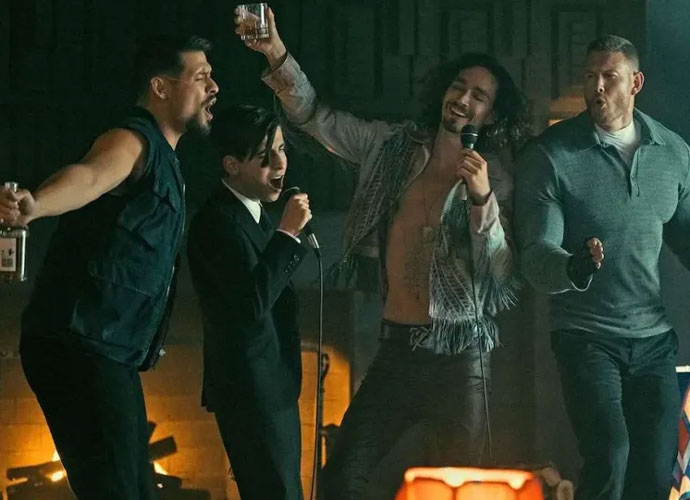‘The Umbrella Academy’ Season 4 TV Review: A Failure To Land

2/5
The Umbrella Academy Season 4 concludes the story of the Hargreeves family after a saga of time travel and apocalypses.
Season 3 concluded with the universe being reset and the main cast losing their superpowers. This season jumps six years from that point, with the siblings acclimated to passably normal lives. Five (Aidan Gallagher) has joined the CIA. Husband and wife Lila (Riya Arya) and Diego (David Castañeda) are leading a suburban life that has taken a toll after such a long time dwelling outside the realm of normality. Klaus (Robert Sheehan), no longer immortal and living in Alison’s (Emmy Raver-Lampman) basement, has traded addiction for intense paranoia, while Alison’s career as an actress and her relationship with her daughter are under immense strain. Ben (Justin H. Min) is newly out on bail after years in prison. Viktor (Elliot Page) owns a bar, and Luther (Tom Hopper) is a “professional dancer” (code for stripper). A birthday party and a kidnapping bring the family back together for a mysterious rescue mission that inevitably becomes more than they bargained for.
Maybe there’s a more tactful way to say the final season simply wasn’t very good, but for economy’s sake, that’s the bottom line. I came into this viewing with the understanding that I’m not the target audience for this show; the time travel theme has grown stale for me. However, The Umbrella Academy has always answered the promise of undeniably compelling characters, interesting twists and awesome displays of superhuman powers.
Season 3 also left some interesting loose strings, such as Reginald Hargreeves’s (Colm Feore) apparent wealth and power in the reset universe and the disappearance of Luther’s wife. Instead of tying together three seasons worth of content, Season 4 introduces an entirely new threat to humanity, once again laying the impending apocalypse at the feet of the Hargreeves family without bothering to answer some outstanding questions. Even the loss of the siblings’ powers is hardly a plot point. Echoing a widespread complaint, I concur that six episodes wasn’t enough to wrap up this story.
This season leaned into graphic imagery in a big way for both humor and horror – lots of vomiting, lots of dismemberment and a bit of visceral Lovecraftian menace to top it off. The body horror felt out of place or unnecessary, and the graphic humor didn’t land. Most attempts at comedy missed the mark, which surprised me given how much I enjoyed the quips and character quirks of past seasons. Season 4 relied heavily on Luther for comedic relief; Hopper clearly understood the assignment, but good delivery doesn’t make up for the fact that the character’s energy was totally out of place amidst the show’s darker themes.
Another recurring gag banked on fatphobic humor, which, as I will forever attest to, is never funny; in the context of action and violence, it’s also bafflingly distracting. For the most part, the season’s humor at best earns a smile and at worst should prompt characters to reflect on their beliefs and preconceived biases. All that said, shout out to Nick Offerman and Megan Mullally, who rarely fail to make me laugh; their performances as conspiracy theorists Dr. Jean and Dr. Gene were no exception.
The ending, without giving it away, is perhaps the biggest disappointment of a cumulatively disjointed, unfulfilling season. There’s very little buildup to what ends up being an incredibly high stakes climax that could have benefitted from a full 10 episodes in trend with Seasons 1-3. Unfortunately, the rush through Season 4 builds to a conclusion that not only feels abrupt, but cancels out the heart of the show. The journey of self discovery and overcoming trauma that these characters have been on is rendered basically irrelevant. There might be a way to make such an ending work (maybe a throwaway line about growing as people for themselves rather than for the world, how it’s about the journey and not the destination, etc…and of course a little more screentime might have helped), but as it stands, the finale left fans quite disappointed.
There are certainly elements of Season 4 worth enjoying, and fans of the preceding three seasons will likely find this viewing worth it, though ultimately unsatisfying. Those unconcerned with the payoff could probably be content with Seasons 1-3 on their own.
RELATED ARTICLES
Get the most-revealing celebrity conversations with the uInterview podcast!







Leave a comment